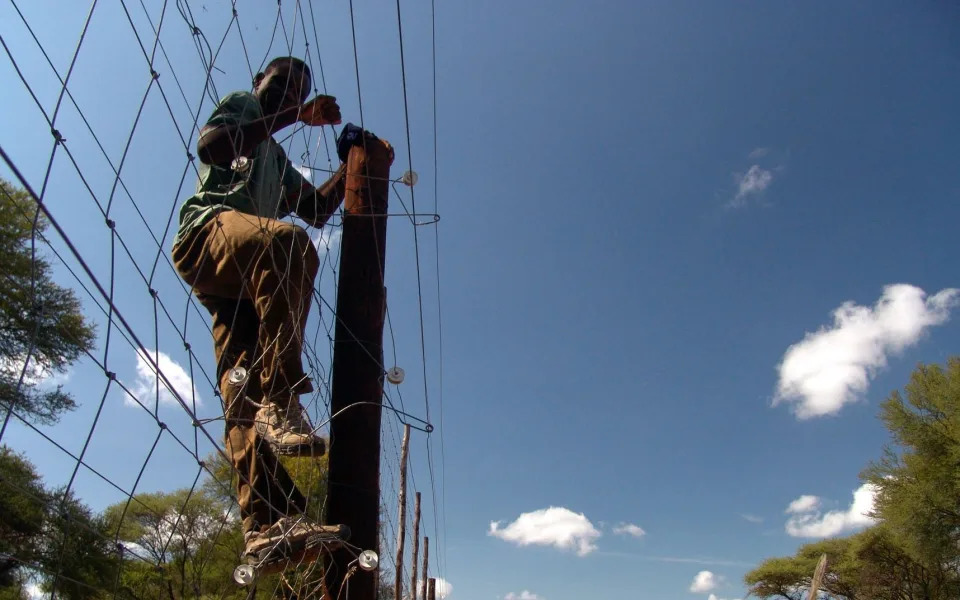Ben Farmer
Mon, 20 November 2023

A Zimbabwean man climbs over the country's border fence with Botswana in the hope of eventually reaching South Africa
South Africa is planning to temporarily withdraw from United Nations refugee conventions so it can restrict immigration.
The country’s ruling African National Congress (ANC) government has said it needs to “press reset” on liberal asylum and immigration policies it can no longer afford.
The proposed overhaul comes amid widespread public resentment at current levels of immigration, and as the ANC is expected to lose its overall majority in next year’s general election.
Immigration is likely to be high on the electoral agenda and polling earlier this year found 89 per cent of voters thought the ANC was not tackling the issue well.
A new government discussion paper proposes temporarily pulling out of the 1951 UN refugee convention and the 1967 refugee status protocol, so officials can tighten up restrictions.
Aaron Motsoaledi, home affairs minister, said South Africa made a mistake signing up to the treaties in the mid-1990s without insisting on opt-outs to certain clauses.
Under the proposed reforms, South Africa would rejoin the conventions after restricting the right for refugees to work, as well as the right to education and the right to claim citizenship.
New laws would also be introduced to make it easier to send refugees back to countries no longer deemed dangerous.
The current liberal laws were adopted in the 1990s when the ANC embraced a pan-African stance on immigration, in part to show thanks to countries that had supported its struggle against apartheid.
Mr Motsoaledi said the policies were now outdated and needed a “radical overhaul”.
He said: “On this continent, the winds of change have been blowing hard and fast. Almost every week there is a coup somewhere in Africa.”
‘Fertile ground for violent clashes’
The ANC says the country’s outdated patchwork of immigration laws needs to be replaced because it has too many vulnerable gaps and loopholes. It argues these have been exploited by traffickers, criminals and economic migrants.
“The policy and legislative gaps within the Department of Home Affairs have created a fertile ground for violent clashes between foreign nationals and citizens, including [the] emergence of belligerent groups, either siding [with] or against the current migration system,” its white paper said.
South Africa’s middle income status, its relative wealth, job opportunities and its democratic institutions mean it attracts more migrants than any other country on the continent.

Two men try to crawl under a border fence between Zimbabwe and South Africa - KIM LUDBROOK/EPA
The 2022 census recorded more than 2.4 million migrants in a population of 62 million, but officials admit they have struggled to accurately assess the numbers because many foreigners are undocumented and enter illegally.
The census found 46 per cent came from neighbouring Zimbabwe, followed by Mozambique and Lesotho.
Yet despite its relative wealth, South Africa is also in the economic doldrums and has an unemployment rate of around 33 per cent. Foreigners are widely blamed for taking jobs from locals, committing crime and overburdening public services.
‘Foreigners a scapegoat’
The country has seen waves of anti-foreigner violence, most recently in 2019, when 12 people died and thousands of foreign nationals lost their homes. Many small foreign-owned businesses, particularly in the main black, densely populated townships around Johannesburg, were destroyed.
Last year a vigilante group called Operation Dadula, meaning “force out” or “knock down” in the Zulu language, picketed public hospitals, turning away anyone who could not prove they were South African.
Fikile Mbalula, the ANC’s secretary general, earlier this year described illegal immigrants as “a ticking time bomb for the country”, straining public finances and slowing efforts to improve services.
Government critics say it is using immigration to deflect from its own mismanagement and its rhetoric risks further increasing anti-foreigner sentiment.
Stephen Friedman, a political analyst, said foreigners in South Africa were a “scapegoat.”
He told South Africa’s Financial Mail: “It is not true that the law just welcomes everyone.
“There is simply no recognition by the government that the vast majority of foreigners in South Africa have skills, work hard and contribute to society.”
The British Government has meanwhile hinted that it may be prepared to quit the European Convention on Human Rights (ECHR), to allow it implement its Rwanda scheme to stop migrants crossing the Channel.
Last week the Supreme Court ruled that the Government’s asylum policy was unlawful, saying that it would break international and human rights laws.
This prompted calls from some Conservative MPs for the UK to leave the ECHR.
No comments:
Post a Comment